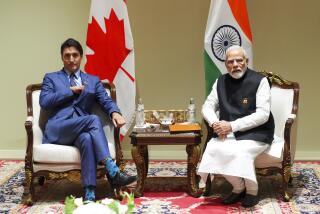Canada Arrested Saudi Too Soon, U.S. Officials Say
- Share via
WASHINGTON — Canada’s decision to arrest an alleged Saudi terrorist last month actually may have hurt the U.S. investigation of the Khobar Towers bombing that killed 19 American service personnel in June in Saudi Arabia, senior law enforcement officials said Thursday.
U.S. officials are frustrated because Canadian authorities opted to abort a longer-term surveillance operation, in turn foiling American investigators’ efforts to use Hani Abdel Rahim Hussein Sayegh as a major independent lead. The decision also thwarted U.S. hopes that Sayegh would provide a richer trove of intelligence regarding individuals, groups and countries that might have played a role in the attack in Dhahran.
As a result of the Canadian action, the United States has not issued a sealed indictment against Sayegh, and none is in the works, according to law enforcement sources.
“Hard evidence is needed for probable cause, and it’s not there,” said a senior U.S. official. “We don’t think he’s a dry hole, but we don’t have enough information on him, and now we’re not likely to get it.”
The case is now “nowhere near being broken,” the source added, despite the initial enthusiasm generated by potential access to someone who may have played a role in the bombing. In papers filed to seek Sayegh’s deportation, Canadian authorities said that the Saudi engaged in surveillance of the residential compound and drove one of two cars that accompanied the explosives-laden truck.
But U.S. officials are also concerned about the validity of such claims, given that much of it came from “uncollaborated information” from Saudi Arabia, based either on interrogations of dissidents detained indefinitely or on “incentives,” the source said. “People come out of the woodwork with information when you offer to pay or threaten,” he noted.
Clinton administration officials familiar with the case said there is good cooperation between Canada and the United States--in sharp contrast to the deep irritation in Washington about the lack of Saudi openness and assistance. Largely the result of initial tip-offs from American and Saudi intelligence sources, the Canadian operation was critical to the only independent U.S. lead in the prolonged and, so far, inconclusive investigation.
Yet if the FBI had run the operation, it would still have Sayegh under surveillance to see if he generated enough information--through contacts or telephone calls--to point the way to others, as well as to allow the United States to indict him, the sources said.
“He was never likely to give us all the answers. He would not be in Canada operating as he was if he was one of the central figures,” the law enforcement official said. “But he might have given us more answers if the operation had gone on a bit longer.”
*
The operation, however, required a lot of personnel and resources and evolved into a situation that Canadian authorities wanted to be “someone else’s problem,” the U.S. official said. “They basically wanted him out.” Canadian officials refused to respond specifically to comments by unnamed U.S. officials. But Gaetan Blais, spokesman for the Canadian Security Intelligence Service said: “We have a mandate to tell the government what may be a threat to [Canada]. On that basis, we took appropriate action.”
With national elections expected later this year, however, political considerations may also have been an issue in Canada’s decision, according to U.S. officials. Successive Canadian administrations have been criticized for lenient immigration policies that have failed to identify criminals and political extremists.
U.S. officials wanted to look further into Sayegh’s connections because of his known ties to Iran, where he admits to having studied theology from 1987 to 1991, and his alleged connections to the Iranian Embassy in Syria, where he may have been a resident for as long as two years. Both American and Saudi investigators said that other Shiite dissidents suspected of having a role in the June attack have strong Iranian links.
But information gleaned in Canada about Sayegh is still insufficient to answer critical questions about Tehran’s role, U.S. law enforcement officials said.
“There are strong Iranian threads running through the fabric. But does that mean the Iranian government sanctioned the bombing? Possibly, but not certainly,” a senior counter-terrorism official said.
Nearly 10 months after the bombing, deep divisions have developed within U.S. and Saudi circles about whether Iran played a direct role in the blast. Some officials are now prepared to finger Iran, while others--hoping to avoid potential repercussions--want to avoid a confrontation with Tehran unless there is specific and verifiable proof.
Washington already has prepared a list of possible ways in which to retaliate, including military strikes, if Tehran’s role is proven, U.S. officials said.
Amid growing speculation, however, Saudi Arabia’s Crown Prince Abdullah and Iran’s President Hashemi Rafsanjani have been engaged in strengthening diplomatic ties.
More to Read
Sign up for Essential California
The most important California stories and recommendations in your inbox every morning.
You may occasionally receive promotional content from the Los Angeles Times.












